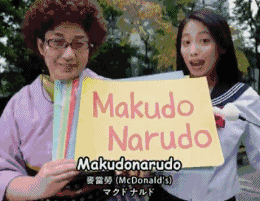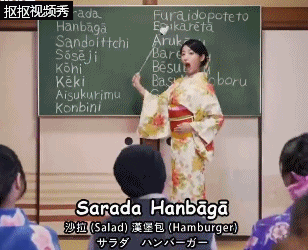话说,不久前有一首超级魔性的日式英语(Japanglish)洗脑神曲。
听完脑袋里全是“ko”、“da”、“ku”、“la”类似的发音....

就是下面这一段日式英语视频,大家自行体会一下:
↓视频4分03秒↓
视频刚开始,一小哥向当地人在咨询哪有好吃的饭店?
Excuse me, any good restaurant?
日本大妈说了一大堆神似英语的话,却直接让小哥一脸懵圈。

原来,大妈说的是日式英语(Japanglish)。

之后,歌曲中教了不少一些旅游中常用的词,像是:
McDonald's——Makudonarudo
Google——Guguru
Toilet——Toiletto
Disneyland——Dizunilando
(左:英语 右:日式英语)

还有一些食品的常用词。

而这首洗脑神曲叫《Tokyo Bon東京盆踊り2020》,是华裔鬼才歌手黄明志的新作。

歌曲MV以日式英语为基础,将一些日本的传统、流行元素结合在一起,不仅洗脑,还朗朗上口,简单好听。

据了解,这首歌由黄明志联合日本新媒体COOL JAPAN TV打造,主要征对第一次去日本旅游,听不懂当地人英语的旅客出品的日式英语教学视频。
不过,这哪是教学视频,简直堪比魔性教程,分分钟让你忘记英语发音……

其实,各国人民学习说非母语语言时,多多少少会带一些本国特有的口音。
今天,我们就来说一说亚洲人的口音,着重中式口音、泰式口音以及韩国英语。
中式口音

去年赵丽颖为Dior拍的宣传片时,一口标准的中式口音就遭到了全网群嘲。
不少网友认为,赵丽颖发音生硬,有一股大碴子味,但并不影响正常的理解。
还有邓超的family被戏谑成伐木累,也是中式英语的一大表现。

老实说,小时候刚学英语的时候,你们有没有用一些相近发音的中文词来学英语发音?
一些简单的字母就很容易找到中文中的替代品,例如:
G:寄
H:诶尺
N:恩
S:挨死
这样学发音,自然带着些中国腔调了。
另外,还有一些由于南北方方言的差异,各个地区的中式英语发音也并不相同。
比如/n/、/l/不分,像是snow和slow;/w/、/v/不分,very念成歪瑞……等问题。
想具体了解各地方言是如何影响英语发音的,可以点这里看看双语君昨天发的文章。

泰式口音

比起中国口音,更可怕的是——泰国口音,绝对算是亚洲口音中的神级别,分分钟把你带跑偏的节奏。
先来个日式英语VS泰式英语感受下:
(耳朵已聋)
而泰国人说英语时,经常会莫名其妙加一些自己的发音,像是尾音为/L/音时,泰国人就会发成/N/的音。
举例来体验一下:
Apple——aiben(矮笨)
Central——sentan(森炭)
Yesterday——yedtade(噎他爹)

还有一些泰式英语的发音教程视频,其中,History念成了Hi+ story /Hais'tɔri/、Island=i+ s + land就成1sland。

韩国口音

韩国人发音比较“直”,舌头不太会打弯,经常会把/r/会发成/l/,/f/会发成/p/。
韩综Running Man里,Gary就经常被叫成“盖累”。

再举两个例子:
Analysis——阿那拉西斯
Africa——阿普里卡

那老外是如何看待亚洲口音的呢?国外知乎Quora上就有类似的问题:
你如何看待亚洲人的英语口音?

Robert Charles Lee是一位有着30多年排版、编辑经验,以英语为母语的老外。他比较全面地指出了亚洲人发音存在的问题,并给出了自己的看法。
对于韩式口音和日式口音,他表示比较难理解,而且很难跟上节奏。

For me, the Koreans and the Japanese have the hardest English-speaking accents to understand.
对于我来说,韩国人和日本人的英语口音最令人费解。
The Japanese have their famous problems with L and R, but they also inject a very characteristic Japanese tone into the rhythm.
日本人最有问题的就是L和R的发音。不仅如此,他们还把独特的日本语调带入英语之中。
The Koreans have a heavy accent in English and then speak in bursts, which is not easy to catch at the first go.
韩国人的英语也有非常浓重的口音。他们总是说的很急,一开始很难跟上他们的节奏。
相较于韩式和日式口音,中式英语则更容易理解,但说得快时,也会有问题。

The Chinese tends to be light and reasonably understandable for most English words.
中国人对大多数的英文单词发音,都比较容易理解。
Their biggest pronunciation problems are with the famous TH, TW, V and S vs. Z -- plus final consonants like the D, G, K, P, T and Z.
他们最大的发音问题就是TH、TW、V 、S和Z。另外,一些词尾的辅音像是D、G、K、 P、T 和Z也很难发标准。
Generally not a problem if they're speaking slow enough, but in a normal conversation (especially over the phone) it's not easy to catch.
一般来说,只要中国人说的足够慢,就能听出来。但如果是正常语速,像是电话通话中,听懂并理解就不是件容易的事情了。
再来看另一个老外的观点,他表示——带着点口音的英语,非常可爱!

Any foreign accent can be perceived as endearing and cute, including, of course, a Chinese accent by US American English speakers.
任何一种口音都很招人喜欢,包括说美式英语时带着点中式口音。
Foreign accents convey a sense of experience, coupled with vulnerability, and humility that often makes their speakers likeable.
外国口音经常传达了说话人的经历,再加上一点点的不自信和谦卑,就让他特别招人喜欢。
Particularly, if said speaker has a superior command of the foreign language.
尤其是,说话者能够很流利地用外语交流时候,就更好了!
Rachel Bush对口音特别喜欢,还直言,带着点口音的英文会让自己特别开心。

For any chinese reading this: don't lose your accent! I love to hear y'all speak and I'm a little disappointed when you try to cover it up with an American accent.
致任何一个可能看到这则消息的中国人:不要丧失你的口音!我很喜欢听你们说话。每一次听到你们模仿标准美音来掩盖中式口音时,我就会有点儿失望。
I don't know what it's about, but it's pleasant to hear and always makes me smile and pay more attention to you.
不知道这是为什么,但是每次我听你们说话时候,都会情不自禁地微笑,并且听得更仔细。
总的看来,老外并没有要求我们说英文时候,必须要有特别标准的发音。相反,稍带着点口音,反而会更招人喜欢一些。

这就像是我们每次面对会说中文的老外,并没有严格要求他们说一口流利、地道的普通话(mandarin)。
带着口音的老外,说中文时,虽然引人发笑,但我们心底还是会赞叹一句:中文说的很棒哟!

所以,追求标准的发音当然很重要,但如果你实在摆脱不了自己的口音,也不要太难过,最重要的还是沟通时的流利度和顺畅度。
你觉得亚洲口音中,哪一个发音最魔性?欢迎在评论区留言哟~